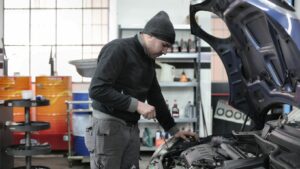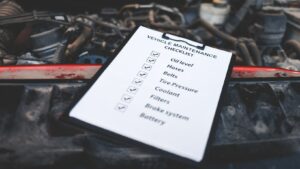Routine Car Maintenance
- Routine Maintenance Is Essential: Regular check-ups enhance vehicle performance, safety, and longevity while preventing costly repairs.
- Key Maintenance Tasks: Focus on critical components like engine oil changes, tire maintenance, brake inspections, and fluid level checks to ensure optimal vehicle function.
- Create a Maintenance Schedule: Structure regular monthly and seasonal checks to ensure timely servicing and effective vehicle care.
- Address Warning Lights Promptly: Ignoring dashboard warning lights can lead to severe vehicle issues; always investigate and address alerts immediately.
- Avoid Common Mistakes: Skipping inspections can jeopardize safety and performance; adhere to a routine to maintain reliability and prevent major repairs.
Routine car maintenance is essential for keeping vehicles running smoothly and safely. Regular check-ups not only enhance performance but also extend the lifespan of the car, saving drivers from costly repairs down the road. Whether it’s changing the oil, rotating tires, or checking the brakes, these simple tasks can make a world of difference.
Many car owners underestimate the importance of a maintenance schedule, often waiting for problems to arise before taking action. By staying proactive, drivers can ensure their vehicles remain in top condition and enjoy peace of mind on the road. Understanding the key components of routine maintenance empowers everyone to take better care of their cars and make informed decisions.
Importance Of Routine Car Maintenance
Routine car maintenance plays a crucial role in ensuring optimal vehicle performance and safety. Regularly scheduled services prevent potential issues and enhance the overall driving experience.
Benefits For Vehicle Longevity
Maintenance extends vehicle lifespan significantly. Regular oil changes prevent engine wear by ensuring lubrication. Timely tire rotations enhance tire life by promoting even wear patterns. Brake inspections safeguard against premature replacement and improve braking efficiency. Routine checks for fluid levels, belts, and filters help avoid major issues, thereby saving on costly repairs and replacements.
Impact On Safety And Performance
 Routine maintenance enhances safety by identifying and addressing vulnerabilities. Regular brake inspections reduce the risk of brake failure, essential for driver and passenger safety.
Routine maintenance enhances safety by identifying and addressing vulnerabilities. Regular brake inspections reduce the risk of brake failure, essential for driver and passenger safety.
Functioning headlights and taillights, maintained through regular inspections, improve visibility in various conditions. An engine tuned for optimal performance increases fuel efficiency, resulting in cost savings on fuel. Overall, routine car maintenance promotes peak performance and reliable operation on the road.
Key Components Of Routine Car Maintenance
Routine car maintenance consists of several key components that contribute to vehicle performance and longevity. Understanding these components aids drivers in maintaining their vehicles effectively.
Engine Oil Change
Engine oil change occurs every 3,000 to 7,500 miles, depending on oil type and manufacturer recommendations. This service ensures proper lubrication within the engine, reducing friction and wear. Fresh oil enhances engine performance, improves fuel efficiency, and decreases harmful emissions. Neglecting oil changes can lead to severe engine damage, resulting in costly repairs.
Tire Maintenance
Tire maintenance includes regular checks of tire pressure and tread depth. Maintaining proper tire pressure ensures optimal fuel efficiency and vehicle handling. Tires should be rotated every 5,000 to 7,500 miles to promote even wear and extend tire lifespan. Additionally, aligning tires helps prevent uneven wear patterns that can affect safety and performance.
Brake Checks
Brake checks involve inspecting brake pads, rotors, and fluid levels at least twice a year. Worn brake pads can diminish stopping power, increasing the risk of accidents. Consistent inspection of brake components enables early identification of issues, ensuring the vehicle maintains effective braking performance. Brake fluid should also be replaced every two years to prevent contamination and maintain braking efficiency.
Fluid Levels Inspection
Fluid levels inspection includes checking engine coolant, transmission fluid, brake fluid, power steering fluid, and windshield washer fluid. Maintaining these fluid levels prevents overheating, ensures smooth operation, and enhances overall vehicle safety. Regular inspections can detect leaks early, allowing for prompt repairs that avoid more severe issues down the road.
How To Create A Routine Maintenance Schedule
Creating a routine maintenance schedule enhances vehicle reliability and performance. A well-structured schedule ensures timely checks and services, extending the car’s lifespan.
Monthly Checks
Monthly checks focus on assessing essential components of a vehicle. Drivers should inspect the following:
- Fluid Levels: Check engine oil, coolant, brake fluid, and windshield washer fluid. Maintaining proper levels prevents overheating and ensures safety.
- Tire Pressure: Verify tire pressure using a gauge. Keeping tires inflated to the manufacturer’s recommended PSI enhances fuel efficiency and safety.
- Lights and Signals: Regularly test headlights, brake lights, and turn signals. Functional lights improve visibility and signal intent to other drivers.
Seasonal Maintenance Tasks
Seasonal tasks address changes in weather conditions that affect vehicle performance. Each season requires specific maintenance actions:
- Spring: Inspect wiper blades for wear, check tire tread depth, and examine the cooling system after winter exposure.
- Summer: Verify air conditioning performance to ensure comfort during hot months, and inspect tires for proper inflation and wear from increased heat.
- Fall: Prepare for winter by checking the battery health, inspecting brakes, and ensuring antifreeze levels are adequate.
- Winter: Evaluate tire conditions, consider switching to winter tires, and make sure wiper fluid contains antifreeze to prevent freezing.
Utilizing Service Shops
Service shops provide professional expertise for routine maintenance. He or she should:
- Schedule Regular Appointments: Set appointments for oil changes, brake inspections, and comprehensive check-ups based on mileage and manufacturer guidelines.
- Request Detailed Reports: After each service, ask for a maintenance log that highlights completed tasks and any recommended future services.
- Build a Relationship with Technicians: Establishing a rapport with service staff helps in understanding the vehicle’s specific needs over time.
By following these structured maintenance strategies, vehicle owners can significantly enhance their car’s reliability and performance on the road.
Common Mistakes To Avoid
Routine car maintenance involves avoiding common pitfalls that can lead to significant vehicle problems. Understanding these mistakes can help drivers keep their vehicles in optimal condition.
Ignoring Warning Lights
 Ignoring warning lights on the dashboard can result in serious vehicle issues. Warning lights indicate potential problems, such as low oil pressure, engine overheating, or malfunctioning brakes.
Ignoring warning lights on the dashboard can result in serious vehicle issues. Warning lights indicate potential problems, such as low oil pressure, engine overheating, or malfunctioning brakes.
Promptly addressing these alerts often prevents minor issues from escalating into major repairs. For example, a check engine light may indicate a simple sensor issue but can lead to engine failure if neglected. Drivers must understand the meaning behind these lights and take action as soon as one illuminates.
Skipping Regular Inspections
Skipping regular inspections jeopardizes vehicle safety and performance. Regular inspections identify potential problems before they develop into costly repairs. Critical systems, including brakes, tires, and headlights, should undergo thorough checks at least twice a year. For instance, failing to inspect brake pads can lead to reduced stopping power and accidents. Sticking to a routine inspection schedule enhances vehicle reliability and keeps drivers informed about necessary maintenance tasks.
Safer Journey for Everyone
Routine car maintenance isn’t just a chore; it’s a vital investment in vehicle longevity and safety. By adopting a proactive approach to maintenance, drivers can prevent minor issues from turning into costly repairs. Regular check-ups and timely inspections ensure that everything from engine performance to braking efficiency remains at its best.
Understanding the importance of each maintenance task empowers drivers to make informed decisions about their vehicles. Establishing a consistent maintenance schedule will not only enhance performance but also provide peace of mind on the road. Prioritizing routine care ultimately leads to a smoother driving experience and a safer journey for everyone.

